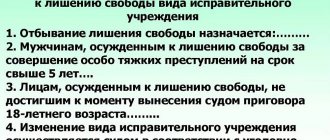Tweet
A fine is one of the most common punishments in judicial criminal practice... However, the efficiency of execution of this type of punishment is very low and does not exceed 30%. In connection with such statistics, the problem of creating a legal mechanism for the execution of a sentence and the grounds and procedure for replacing this type of punishment with another punishment, including imprisonment, is raised in the event of malicious evasion of its payment. Judicial practice on replacing a fine with imprisonment is ambiguous. Law enforcement officials have different understandings of the criteria (rules) for determining the term of imprisonment instead of a fine.
If a fine is imposed as an additional punishment, its replacement with another punishment, including imprisonment, is impossible under any circumstances.
According to Part 5 of Art. 46 of the Criminal Code of the Russian Federation in the case of malicious evasion of payment of a fine in an amount calculated on the basis of the value, a multiple of the value of the item or the amount of commercial bribery or bribery imposed as the main punishment, the fine is replaced by a punishment within the limits of the sanction provided for by the relevant article of the Special Part of the Criminal Code of the Russian Federation. The specified method (multiple calculation) of determining the amount of the fine is used when convicting a person under Art. 200.1 of the Criminal Code of the Russian Federation, Art. 204 of the Criminal Code of the Russian Federation, art. 290 of the Criminal Code of the Russian Federation, Art. 291 of the Criminal Code of the Russian Federation, art. 291.1 of the Criminal Code of the Russian Federation
Exact interpretation of Part 5 of Art. 46 of the Criminal Code of the Russian Federation allows us to identify two mandatory features that have legal significance for determining the circle of persons sentenced to a fine, in respect of whom the question of replacing it with imprisonment may be raised before the court.
Grounds for replacing a fine with imprisonment
In accordance with Part 5 of Art. 46 of the Criminal Code of the Russian Federation, replacing a fine with a more severe punishment is possible only in case of malicious evasion of its payment. At the same time, the criminal law does not define the concept of “malicious evasion of paying a fine.” In addition, the malicious nature of the evasion is the basis for replacing it with any punishment from the sanction provided for in the article of the Criminal Code of the Russian Federation under which the perpetrator was convicted. There is a special basis for replacing a fine with imprisonment if the convicted person formally falls under Part 5 of Art. 46 of the Criminal Code, not established... Since punishment in the form of forced labor is not currently applied, the choice of punishment between imprisonment and restriction of freedom when replacing a fine occurs exclusively in the case where a person is convicted under Part 1 of Art. 204 of the Criminal Code of the Russian Federation.
The concept of “malicious evasion” as a basis for replacing a fine with a more severe punishment appears in other articles of the Criminal Code of the Russian Federation. And only when establishing the grounds for replacing forced labor with deprivation of liberty, the legislator uses the concept of “evasion from serving a sentence” (Part 6 of Article 53.1 of the Criminal Code).
Thus, the concept of “malicious evasion from serving a sentence” in criminal law is associated in its content with a specific type of punishment. It is not disclosed in the Criminal Code of the Russian Federation and is in fact evaluative.
The PVS resolution dated December 22, 2015 clarifies that when considering the issue of replacing a fine imposed as the main punishment with another type of punishment, courts must check the arguments that the convicted person did not evade paying the fine and did not pay it on time for good reasons. The mere fact that a convicted person does not have funds cannot be recognized as a valid reason for failure to pay a fine on time. Reasonable reasons may include circumstances that arose after the sentencing, as a result of which the convicted person was deprived of the opportunity to pay the fine on time. For example, loss of legal capacity, treatment in a hospital facility, loss of earnings or property due to circumstances beyond his control.
The Supreme Court of the Russian Federation has recently changed its position on this issue and directs the courts, when establishing malicious failure to pay a fine by a convicted person, to take into account circumstances that may objectively prevent the convicted person from executing the sentence in terms of payment.
Thus, in legislation and in judicial practice there is no single approach to understanding the malicious evasion of a convicted person from paying a fine. The Supreme Court of the Russian Federation invites courts to take into account the subjective factor, that is, whether there was intent on the part of the person convicted of non-payment of the fine. Such intent and the reluctance of the convicted person to pay the fine can be objectively confirmed by a set of specific circumstances (real or potential financial or other material ability to pay the fine, refusal to work, etc.).
What it is
The main option for administrative impact on offenders is a monetary fine. Its characteristics are defined by Article 3.5 of the Code of Administrative Offenses of the Russian Federation:
- a sanction can be imposed not only by a court, but also by an official or an authorized body considering an administrative case;
- the law provides for a minimum fine of 100 rubles, and for violation of traffic rules the punishment cannot be less than 500 rubles;
- the maximum possible amount of the fine will depend on the specific composition of the Special Part of the Code of Administrative Offenses of the Russian Federation, as well as the status of the offender.
In Art. 3.5 of the Code of Administrative Offenses of the Russian Federation sets the maximum amount of money that can be recovered from the violator. It cannot exceed 5000 rubles. (for individuals), 50 thousand rubles. (for officials), 1 million rubles. (for legal entities and individual entrepreneurs). The same article specifies exceptions that allow a fine to be imposed in a significantly larger amount - they correspond to individual offenses.
The procedure for determining the amount of the sanction depends on the nature of the offense committed:
- a fine in the form of a fixed amount is the basic version of punishment;
- in an amount that is a multiple of unpaid taxes, fees, duties and other obligatory payments to the budgets;
- a multiple of the cost of a state or municipal contract;
- based on the amount of unfulfilled obligations under contracts (for example, for violation of consumer rights);
- in a multiple of the cadastral value of the property;
- other multiple calculation options specified in Art. 3.5 Code of Administrative Offenses of the Russian Federation.
For example, if an article of the Code of Administrative Offenses of the Russian Federation provides for the possibility of imposing a fine for violating traffic rules, it will always be calculated in a fixed fixed amount (the minimum and maximum limit will be indicated in a specific article of the code). If we are talking about violation of the procedure for paying taxes or submitting reports, the amount of damage is established to calculate the sanction.
A special case of determining the amount of punishment is liability for failure to comply with a previous sanction. For example, for an overdue fine, the traffic police may impose new sanctions. In this case, the violator is charged twice the amount of the previously imposed fine.
In Art. 3.5 of the Code of Administrative Offenses of the Russian Federation indicates the only category of citizens for whom a fine cannot be imposed - conscripts serving in the ranks of the RF Armed Forces, as well as cadets of military universities before the conclusion of the first contract for service.
Deadlines for payment of fines and their deferment, installments
Failure to comply with the deadlines for paying a fine is a formal basis for submitting a motion to the court to replace the fine with another punishment. hence, the correct calculation of the period during which the fine must be paid by the convicted person is decisive for the occurrence of legal consequences for him.
Article 31 of the Penal Code of the Russian Federation establishes deadlines, failure to comply with which allows the bailiff to send a presentation to the court. Part 1 of this article defines the general rule on the timing of payment of a fine: within 60 days from the date the sentence enters into legal force. According to part three of this norm, when paying a fine in installments, the convicted person is obliged to make the first monetary payment within 60 days after the entry into force of the court decision providing for the installment plan. The remaining portions of the fine are paid monthly no later than the last day of each subsequent month. The installment payment period for the fine is unified. If, simultaneously with the imposition of punishment, the court decides in its verdict to pay the fine in installments, the period is set within 5 years. If the court applies installment payment of the fine on the basis of Part 2 of Art. 31 of the Penal Code of the Russian Federation in the execution of a sentence (Article 399 of the Code of Criminal Procedure of the Russian Federation), the period of such installment plan is also determined within 5 years.
In accordance with Part 2 of Art. 398 of the Code of Criminal Procedure of the Russian Federation, payment of a fine can not only be spread over up to 5 years, but also deferred for the same period. Deferment of payment of a fine postpones the moment when the convicted person must pay the fine, and during the period of deferment he does not fall under the category of a willful defaulter with all the ensuing consequences for him.
Procedure for replacing a fine with another punishment
Violation by a convicted person of the deadline for paying a fine, that is, the convicted person’s malicious evasion of execution of the sentence, obliges the bailiff no earlier than 10 days, but no later than 30 days from the date of expiration of the deadline for payment of the fine, to send to the court a proposal to replace the fine with another punishment (Part 2 Article 32 of the Penal Code of the Russian Federation). In fact, a month’s period is given by law to the bailiff to prepare the materials necessary for consideration of this issue in court. This period is quite realistic in cases where the convicted person is not hiding. Part 9 art. 103 of the Federal Law “On Enforcement Proceedings” also establishes a 10-day period for sending to the court that passed the sentence a proposal to replace the fine with another type of punishment. But, unlike Part 2 of Art. 32 of the Penal Code of the Russian Federation, this law does not indicate a deadline for submitting a presentation to the court.
What will be the penalties for workers?
It can come from the state or from the employee himself.
Fine from the labor inspectorate
For fining an employee, the entrepreneur risks paying the fine himself. The principled employee will complain to the labor inspectorate. From there they will come with an unscheduled inspection. Inspectors will look at orders for fines, compare wages under contracts with payslips and punish under Art. 5.27 Code of Administrative Offenses of the Russian Federation. An individual entrepreneur faces a fine from 1000 to 5000 rubles, a legal entity - from 30,000 to 50,000 rubles.
Claim from an employee
Deducting a fine from the salary means not paying the employee all the promised money. You can not do it this way. The employee will go to court and recover the cut portion. On top of that, the court will charge interest and add moral damages under Art. 237 Labor Code of the Russian Federation.
Judicial procedure for replacing a fine with imprisonment
The question of replacing a fine with another type of punishment on the basis of Part 5 of Art. 46 of the Criminal Code of the Russian Federation is subject to consideration at a court hearing in connection with the submission of a bailiff's presentation to the court. If within the framework of the proceedings there is no need to detain and take into custody a convicted person who is maliciously evading payment of a fine, then the procedure for considering the corresponding presentation of the bailiff takes place in the usual manner, provided for in parts 2 and 3 of Art. 399 Code of Criminal Procedure of the Russian Federation.
A convicted person who maliciously evades payment of a fine may go into hiding and his whereabouts may be unknown. Therefore, in accordance with Part 4 of Art. 32 of the Criminal Code of the Russian Federation, in relation to such situations, provides for the placement of a convicted person on the wanted list and his subsequent detention for up to 48 hours with the possibility of extension in court for up to 30 days. If the convicted person was detained before the court considered a proposal to replace the fine with imprisonment and the court satisfied this proposal, the time of detention is counted towards the term of serving the sentence of imprisonment by the convicted person.
When a judge considers a bailiff's request to take a convicted person into custody until the issue of replacing the fine with another punishment is decided, he, regardless of the remaining unpaid amount of the fine, has the right to arrest him for up to 30 days
Since the criminal law does not indicate any formal proportions when determining the term of imprisonment instead of a fine, when considering the bailiff’s proposal to take into custody a convicted person until the issue of replacing the fine with another punishment is decided, the judge, regardless of the remaining unpaid amount of the fine, has the right to arrest the convicted person for a term up to 30 days. The court has the right to consider materials on the detention of a convicted person in accordance with paragraph 18 of Art. 397 of the Code of Criminal Procedure of the Russian Federation, when the bailiff has not yet sent to the court a proposal to replace the fine with l/s
In accordance with Part 5 of Art. 46 of the Criminal Code of the Russian Federation, when replacing a fine, the new punishment cannot be conditional, that is, the provisions of Art. 73 of the Criminal Code of the Russian Federation do not apply here.
The procedure for calculating the term of imprisonment when replacing a fine
The law does not regulate the issue of comparability of the fine imposed as the main punishment and other types of punishment, their adequacy, symmetry. The courts in such a situation are guided by the fact that the fine is replaced by punishment within the limits of the sanction provided for in Art. 204, 290–291.1 of the Criminal Code of the Russian Federation. In this case, the court must take into account the amount of the fine imposed by the court verdict and the part of the fine actually paid by the convicted person. In this regard, the RF Supreme Court in clause 5.2 of Resolution No. 21 explained that when deciding on the type and duration of the punishment that replaces the fine, in accordance with Art. 71 of the Criminal Code of the Russian Federation, the fine cannot be correlated with l/s and other types of basic punishments. The type and duration of other punishment in this case are determined based on the amount of the unpaid fine.
Thus, the malicious evasion of a convicted person from paying a fine imposed in multiple calculations entails the replacement of this type of punishment as the main one with imprisonment. Since punishment in the form of forced labor is not currently applied, restriction of freedom can be used as an alternative to a fine, but only if it is imposed upon conviction of a person under Part 1 of Art. 204 of the Criminal Code of the Russian Federation. The content of malicious evasion of a convicted person from serving a sentence in criminal law is associated with a specific type of punishment and is evaluative in nature. PEC of the Russian Federation and Part 6 of Art. 103 of the Law on Enforcement Proceedings stand on the formal position of recognizing a convicted person as maliciously evading payment of a fine based on compliance or non-compliance with the deadlines for its repayment. The Plenum of the Armed Forces of the Russian Federation directs the courts, when establishing the seriousness of a convicted person’s failure to pay a fine, to take into account circumstances that may objectively prevent the convicted person from executing the sentence. The explanations of the country's highest court reflect modern judicial practice, which narrows the possibilities of replacing a fine with another punishment due to a strict, narrower understanding of the criteria for malicious evasion of paying a fine. Each time the court must establish circumstances indicating a conscious evasion by the convicted person from execution of the sentence.
Related topics:
- Replacement of the unserved part of the sentence with a milder type of punishment Tax evasion Replacement of imprisonment with correctional labor Replacement of the main punishment in the form of a fine with another punishment Petition to replace the punishment of imprisonment with forced labor
How can you punish an employee with a ruble?
Reprimands and comments have little effectiveness. Lazy people don't work harder, thieves continue to take from the cash register. There are ways to pay an employee less because of problems. But we repeat: these are not fines. It’s impossible for an accountant to get away with deducting 1000 rubles from his salary. On the contrary, you will need additional paperwork and, most likely, the help of a personnel officer or lawyer.
Deprive the bonus
A bonus is an incentive under Art. 191 Labor Code of the Russian Federation. No bonus is given for stupid work.
In order to deprive a bonus, a provision on bonuses must be adopted. This is a useful thing for an entrepreneur. The regulations write specific conditions for which the employee receives a bonus. Be sure to include a clause that the bonus is paid at the discretion of management. Reducing bonuses helps in the fight against tardiness, idleness and negligence.
Article: 5 legal ways to fire an employee without his desire
Withhold damage from salary
The employee is responsible for work equipment, goods and money. The employee must reimburse the purchase of glasses to replace broken ones and any shortages at the cash register. This is how financial liability works under Art. 238 Labor Code of the Russian Federation.
Damage is calculated down to the penny. The employee is asked to explain - maybe it was not he who broke the glasses, but a drunk client. A deduction order is issued. No more than 20% per month is deducted from your salary.
Article: how to recover damages from an employee
Conclude agreements on full financial liability
Any employee is liable for damages within the limits of average earnings. But you can enter into agreements on full financial responsibility with cashiers, sellers, administrators and merchandisers. Such agreements legally remove restrictions on money. For shortages at the cash register or damaged goods, you can ask the culprit instead of scattering an illegal fine throughout the entire team. Details - in Art. 242 Labor Code of the Russian Federation.
Article: how to correctly draw up an agreement on full financial liability






